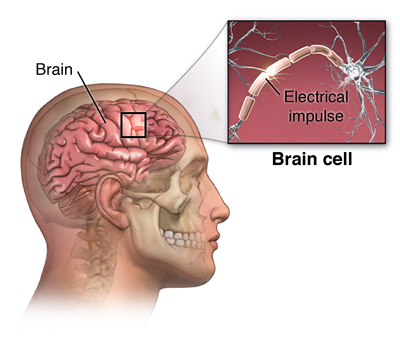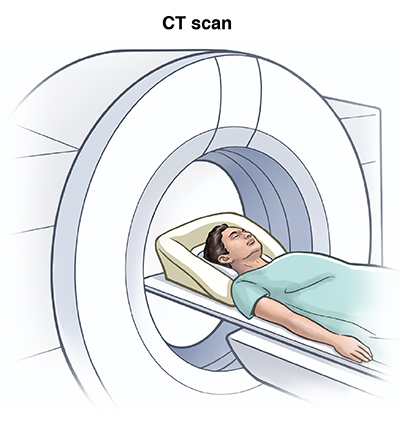What Happens to Your Body After a Seizure
What is epilepsy?
Epilepsy is a brain condition that causes a person to take seizures. It is one of the well-nigh mutual disorders of the nervous organisation. Information technology affects people of all ages, races, and ethnic backgrounds.

The brain consists of nervus cells that communicate with each other through electrical activity. A seizure occurs when one or more parts of the brain has a burst of abnormal electric signals that interrupt normal brain signals. Annihilation that interrupts the normal connections betwixt nervus cells in the brain can crusade a seizure. This includes a high fever, high or low blood sugar, alcohol or drug withdrawal, or a brain concussion. Only when a person has two or more seizures with no known cause, this is diagnosed as epilepsy.
At that place are different types of seizures. The type of seizure depends on which part and how much of the brain is affected and what happens during the seizure. The 2 main categories of epileptic seizures are focal (partial) seizure and generalized seizure.
Focal (fractional) seizures
Focal seizures take place when aberrant electric brain office occurs in ane or more areas of ane side of the brain. Before a focal seizure, you may accept an aureola, or signs that a seizure is about to occur. This is more common with a complex focal seizure. The nigh common aureola involves feelings, such as deja vu, impending doom, fear, or euphoria. Or you may have visual changes, hearing abnormalities, or changes in your sense of odor. The 2 types of focal seizures include:
Unproblematic focal seizure
The symptoms depend on which expanse of the brain is affected. If the abnormal electrical brain part is in the part of the brain involved with vision (occipital lobe), your sight may exist contradistinct. More than oftentimes, muscles are affected. The seizure activity is express to an isolated muscle group. For instance, it may merely include the fingers, or larger muscles in the artillery and legs. Y'all may also have sweating, nausea, or become pale. You don't lose consciousness in this type of seizure.
Complex focal seizure
This blazon of seizure frequently occurs in the surface area of the brain that controls emotion and retention function (temporal lobe). You will likely lose consciousness. This may not mean you pass out. You lot may just end being aware of what's going on around yous. You may look awake, merely take a diversity of unusual behaviors. These may range from gagging, lip smacking, running, screaming, crying, or laughing. You may exist tired or sleepy subsequently the seizure. This is called the postictal period.
Generalized seizure
A generalized seizure occurs in both sides of the brain. You will lose consciousness and be tired after the seizure (postictal land). Types of generalized seizures include:
Absence seizure
This is likewise called petit mal seizure. This seizure causes a cursory changed state of consciousness and staring. You volition likely maintain your posture. Your rima oris or face may twitch or your eyes may blink rapidly. The seizure usually lasts no longer than 30 seconds. When the seizure is over, you may not call up what just occurred. You may go on with your activities every bit though zip happened. These seizures may occur several times a day.
Atonic seizure
This is too chosen a drop attack. With an atonic seizure, you have a sudden loss of muscle tone and may fall from a standing position or suddenly drib your head. During the seizure, you will be limp and unresponsive.
Generalized tonic-clonic seizure (GTC)
This is also called grand mal seizure. The classic grade of this kind of seizure has 5 distinct phases. Your trunk, artillery, and legs will flex (contract), extend (straighten out), and tremor (shake). This is followed past contraction and relaxation of the muscles (clonic period) and the postictal period. During the postictal menses, you may be sleepy. Yous may have problems with vision or speech, and may have a bad headache, fatigue, or body aches. Non all of these phases occur in everyone with this type of seizure.
Myoclonic seizure
This type of seizure causes quick movements or sudden jerking of a grouping of muscles. These seizures tend to occur in clusters. This means that they may occur several times a mean solar day, or for several days in a row.
What causes a seizure?
A seizure can be acquired past many things. These can include:
-
An imbalance of nerve-signaling brain chemicals (neurotransmitters)
-
Brain tumor
-
Stroke
-
Brain impairment from illness or injury
Epilepsy may be caused by a combination of these. In most cases, the crusade of epilepsy can't be found.
What are the symptoms of a seizure?
Your symptoms depend on the type of seizure. General symptoms or warning signs of a seizure tin can include:
-
Staring
-
Jerking movements of the arms and legs
-
Stiffening of the trunk
-
Loss of consciousness
-
Breathing problems or stopping breathing
-
Loss of bowel or bladder control
-
Falling suddenly for no apparent reason, peculiarly when associated with loss of consciousness
-
Not responding to noise or words for cursory periods
-
Appearing confused or in a haze
-
Nodding your head rhythmically, when associated with loss of sensation or loss of consciousness
-
Periods of rapid eye blinking and staring
During the seizure, your lips may become tinted blueish and your animate may not be normal. Later on the seizure, you lot may be sleepy or confused.
The symptoms of a seizure may be similar those of other health conditions. Make sure to talk with your healthcare provider for a diagnosis.
How are seizures diagnosed?
Your healthcare provider will inquire most your symptoms and your health history. You'll be asked most other factors that may take caused your seizure, such every bit:
-
Drug or booze apply
-
A contempo injury to the caput
-
High fever or infection
-
Genetic abnormality
Y'all may as well have:

-
A neurological exam
-
Claret tests to cheque for issues in claret sugar and other factors
-
Imaging tests of the encephalon, such every bit an MRI or CT browse
-
Electroencephalogram, to test your brain'southward electrical action
-
Lumbar puncture (spinal tap), to measure the pressure level in the brain and spinal canal and examination the cerebral spinal fluid for infection or other problems
How are seizures treated?
The goal of handling is to command, stop, or reduce how ofttimes seizures occur. Treatment is most oftentimes done with medicine. In that location are many types of medicines used to treat epilepsy. Your healthcare provider will demand to identify the blazon of seizure you are having. Medicines are selected based on the type of seizure, historic period of the person, side furnishings, cost, and ease of employ. Medicines used at home are usually taken by rima oris as capsules, tablets, sprinkles, or syrup. Some medicines can be given into the rectum. If you are in the hospital with seizures, medicine may be given by injection or intravenously by vein (4).
It is important to take your medicine on time and as prescribed by your doc. People's bodies react to medicine differently so your schedule and dosage may demand to be adjusted for the best seizure command. All medicines can take side effects. Talk with your healthcare provider about possible side effects. While yous are taking medicine, you may need tests to see how well the medicine is working. You may have:
-
Claret tests. Y'all may demand blood tests oft to check the level of medicine in your body. Based on this level, your healthcare provider may change the dose of your medicine. Y'all may too take claret tests to bank check the effects of the medicine on your other organs.
-
Urine tests. Your urine may exist tested to encounter how your body is reacting to the medicine.
-
Electroencephalogram (EEG). An EEG is a procedure that records the brain'due south electric activity. This is done by attaching electrodes to your scalp. This test is done to see how medicine is helping the electrical problems in your brain.
Other treatments
If medicine doesn't piece of work well enough for you, your healthcare provider may propose other types of treatment. You may take:
Vagus nerve stimulation (VNS)
This handling sends pocket-size pulses of free energy to the brain from one of the vagus fretfulness. This is a pair of large fretfulness in the cervix. If you have fractional seizures that are not controlled well with medicine, VNS may be an option. VNS is done by surgically placing a minor bombardment into the breast wall. Small-scale wires are and then attached to the battery and placed under the peel and around one of the vagus nerves. The battery is then programmed to send energy impulses every few minutes to the brain. When you feel a seizure coming on, you may activate the impulses by holding a small-scale magnet over the battery. In many cases, this will assist to terminate the seizure. VNS can have side furnishings such as hoarse voice, pain in the throat, or modify in vocalization.
Surgery
Surgery may exist done to remove the function of the brain where the seizures are occurring. Or the surgery helps to stop the spread of the bad electrical currents through the brain. Surgery may be an option if your seizures are difficult to control and ever first in i part of the brain that doesn't affect spoken communication, retention, or vision. Surgery for epilepsy seizures is very complex. It is done by a specialized surgical team. You may be awake during the surgery. The brain itself does not feel pain. If you lot are awake and able to follow commands, the surgeons are meliorate able to check areas of your encephalon during the process. Surgery is not an option for everyone with seizures.
Living with epilepsy
If you have epilepsy, you lot can manage your health. Make sure to:
-
Have your medicine exactly as directed
-
Get enough sleep, as lack of sleep tin trigger a seizure
-
Avoid anything that may trigger a seizure
-
Have tests equally oft as needed
-
See your healthcare provider regularly
When should I telephone call my healthcare provider?
Telephone call your healthcare provider if:
-
Your symptoms get worse or do not get meliorate
-
You take side effects from medicine
Primal points nearly epilepsy and seizures
-
A seizure occurs when one or more than parts of the brain has a flare-up of abnormal electrical signals that interrupt normal signals
-
In that location are many types of seizures. Each tin cause different kinds of symptoms. These range from slight body movements to loss of consciousness and convulsions.
-
Epilepsy is when you take 2 or more than seizures with no known cause.
-
Epilepsy is treated with medicine. In some cases, information technology may be treated with VNS or surgery.
-
It's important to avoid anything that triggers seizures. This includes lack of sleep.
Source: https://www.hopkinsmedicine.org/health/conditions-and-diseases/epilepsy/evaluation-of-a-firsttime-seizure
0 Response to "What Happens to Your Body After a Seizure"
Post a Comment